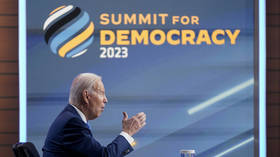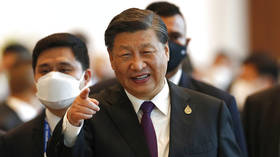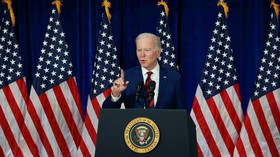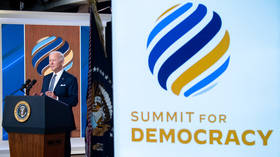Chinese barb stings Biden’s second ‘Summit for Democracy’

The US played co-host to the second ‘Summit for Democracy’ last week along with the governments of Costa Rica, the Netherlands, South Korea and Zambia.
The two-day event was a gathering of world leaders in a virtual, plenary format, where representatives from government, civil society, and the private sector took part. The biennial exercise ostensibly seeks to strengthen democracy, defend against authoritarianism, fight corruption, and promote civil society’s respect for human rights.
US President Joe Biden spelled out the objectives of the event in his opening remarks in Washington on Wednesday as “not just to speak high-minded words and shine a spotlight on those critical issues, but to galvanize actions that translate to concrete progress for people around the world.”
The American vision of democracy
President Biden reminded the audience that democracy is “working,” despite accepting its decline in the past 15 years. Unfazed by the headwinds of democratic recession, he cited three examples to drive his point home.
For instance, the oil-rich southern African nation of Angola has built an independent judiciary that would expedite justice. The Dominican Republic, a Caribbean nation, has given more teeth to its anti-corruption law. Similarly, Croatia, an eastern European country in the Balkan peninsula, is on overdrive to increase transparency in governance, according to the US president.
He singled out “the brave Ukrainian people as they defend their democracy” against Russia while pledging $690 million – in addition to the $400 million that was committed in December 2021 in the first edition of the summit – to promote democracy across the world for the next two years. Overall, the US has given around $80 billion in aid to Ukraine, including $46.6 billion to buy weapons, under the guise of defending democracy and upholding human rights.
Washington promised to loosen its purse strings as the Biden administration seeks to commit $9.5 billion to “advance democracy” around the world.
Altogether, the Biden administration had invited 120 world leaders to the summit. However, a day ahead of the summit, Pakistan, an ‘all-weather ally’ of China and a primary US “authoritarian” adversary, struck a discordant note and pulled out.
Chairman of the Pakistan Defense Committee Mushahid Hussain Syed lashed out at the US for “weaponizing democracy and human rights in the emerging World War against China and Russia,” as the world stands divided on whether Washington’s model of democracy is worth emulating.
A ‘slap in the face’ for the US?
Ahead of the Biden administration’s democracy brouhaha, China couldn’t have found a more opportune moment – the 20th anniversary of the US-led invasion of Iraq on March 20 – to release a damning report against Washington. The report, published by China’s Ministry of Foreign Affairs, entitled, ‘The State of Democracy in the United States: 2022’ is a trenchant criticism of the “dysfunctional” American democracy and how it has had a cascading chaotic effect on the world at large.
China’s evaluation was released amid growing signs that countries of the Global South are showing discontent against the growing US hegemony and turning elsewhere – a trend that some analysts see as a “slap in the face” for the US.
The report is divided in four parts and peppered with facts, media comments and expert opinions. China has found a pattern and noted the “vicious cycle of democratic pretensions, dysfunctional politics and a divided society that continued in the US.” It has identified maladies such as “money politics, identity politics, social rifts, and the gulf between the rich and poor” that “further revealed US governance failure and institutional defects.” Beijing has categorically blamed the failure of the US democratic system in learning its lessons while referring to the Capitol Hill riots on January 6, 2021, as “political violence continued to grow and deteriorate.”
Beijing has questioned the concerted efforts of the US to monopolize the definition of democracy, which, in turn, has been a cause for concern while instigating “division and confrontation.”
Washington has been singled out as the primary violator of the United Nations (UN) charter and other allied international laws and norms. China cites examples of meddling in its internal affairs on issues related to its Communist ideology, Taiwan, Hong Kong, the Xinjiang province and Tibet. Beijing has also taken a dig at the US for its subversive role in the Russia-Ukraine conflict that entered its second year on February 24.
As an illustration of the selective way the US democratic outreach works on a global stage, the Chinese publication cites a report by the Serbian Center for Strategic Prognosis think tank, which pointed out that “the US saw Russia’s 1999 attack on Grozny, the capital of Chechnya, as a crime, but called a similar American operation in Fallujah, an Iraqi city about the size of Grozny, liberation.”
“America’s so-called democracy has long been hijacked by interest groups and capital, and brought instability and chaos to the world,” the report concludes.
Slamming the Biden administration’s “democracy” outreach as a bid to ratchet up tension and confrontation among nations with divergent views, China’s report advocates for a confluence of solidarity as a “collective response to global challenges,” where freedom, democracy and human rights are practiced the same way they are preached.
Define “democracy”
Some of the global leaders invited to the Summit for Democracy have had questionable credentials. Consider this: India’s opposition leader Rahul Gandhi has been disqualified as a Parliamentarian as a lower court in Prime Minister Narendra Modi’s home state of Gujarat has handed down a two-year jail sentence. Israeli President Benjamin Netanyahu is on a warpath back home for curbing judicial independence. Mexican President Andrés Manuel López Obrador’s reforms threaten democracy amid looming fears over a bid to end free and fair elections. Meanwhile, European Union members Turkey and Hungary were kept out of the frame ostensibly because they lack civil liberties that would classify these nations as illiberal democracies.
Russia and Ukraine are two more prime examples of the Biden administration’s selective approach to defining democracy. Russia, despite US reservations, remains a liberal democracy. Ukraine, under President Vladimir Zelensky, has slid into an autocratic regime where corruption and personal loyalties have been preferred over meritocracy and competence – fighting corruption was among the campaign promises that helped him win the election, but were quickly abandoned after he assumed office.
As a self-proclaimed ‘champion of democracy’, the US is spreading good cheer and basking in its own glory, acting primarily in its own interests while professing to be doing common good for other nations.
When necessary, it will attempt to manufacture democracy at gunpoint, like it tried to do in Iraq and Afghanistan. While it invariably fails to bring about actual democratic change, it’s always successful in creating lucrative markets for the American military industrial complex and other companies.
One must look no further than the Middle East and the Arab world, where the US has been the biggest catalyst of conflict, bloodshed and human misery. The US sees the volatile region as a ready market buoyed by oil revenues to sell arms and military hardware with impunity, as several Arab nations are locked in protracted conflicts with their neighbors such as Saudi Arabia’s fight against the Houthi rebels in Yemen.
China, meanwhile, is pouring money into nations of the Global South, whose suffering has been aggravated because of Western sanctions, making them dependent on Beijing’s largesse – and doing so without trying to educate them on values and the drummed-up global conflict between authoritarianism and democracy.
The US is unlikely to win over these fledgling democracies, who are tired of Washington’s penchant for giving sermons and setting political conditions. Ultimately, the Global South will be loyal to those who are willing to offer a line of credit and generous financial assistance. All the White House has to offer them are platitudes – democracy be damned!
The statements, views and opinions expressed in this column are solely those of the author and do not necessarily represent those of RT.















